15 Learnings From an Extremely Online War
The internet's impact on Russia's invasion of Ukraine
Here are 15 things I’ve learned from Russia-Ukraine as the first Extremely Online War.
I. Web3
- Crypto Funds The Meme Of The Moment
- Not So Quiet on The Deplatforming Front
II. Web2 - What Social Media Wants is not What Humans Want
- Everything Is Public
- When Everything Is Public, Everything Is A Performance
- Ukraine Has Captured This Memetic Moment
- Purity Spirals Should Be Flagged
- Authoritarian Subreddits Fall Down A Memeplex They Can’t Escape
- Charismatic Politicians Win The Internet
III. Energy - Supply Chains in Everything
- It’s The Business Model, Stupid!
- Petrostates Create Dictators Like Putin
- We Need An Exit Ramp For Petrostates
IV. Geopolitics in the 2020s - Nuclear War Looms Large…ish
- NATO Desires Are Inevitable
Well, I guess I learned things. Here’s #16:
The International #Cat Federation has banned #Russian cats from its shows. pic.twitter.com/R4JRNrb0h2
— NEXTA (@nexta_tv) March 3, 2022
Onto the actual list 🙂
I. Web3
1. Crypto Funds The Meme Of The Moment
Right now, the meme of the moment is #StandWithUkraine.
Crypto donations for Ukraine have surpassed $50M.
The Crypto Fund of Ukraine raised $50M in crypto in a week to support #Ukraine 👊🏻 An incredible unity before Putin's encroachment on freedom and democracy. Aiming for $100M this week. We WILL win! 🇺🇦 #StandWithUkraine
— Mykhailo Fedorov (@FedorovMykhailo) March 4, 2022
This is expected. Old memes like #MeToo had a harder time raising money. New memes like #StandWithUkraine can raise funds in a permissionless way.
ImpactNFTs are coming soon to a feed near you.
2. Not So Quiet on The Deplatforming Front
Modern wars have two parallel strands: the physical tanks and the digital info war.
The digital war has many sides, one of which is the Deplatforming Front. Should tech companies deplatform the Russian government or their citizens?
Federov Mykhalio, the VP of Ukraine, sure thinks so. He’s called for every tech company to deplatform all Russians.
Apple and Microsoft have stopped selling their products in Russia on Monday. Visa and Mastercard debanked Russians last week.
Crypto companies will not debank their Russian users unless forced to by law.
8/ Some ordinary Russians are using crypto as a lifeline now that their currency has collapsed. Many of them likely oppose what their country is doing, and a ban would hurt them, too. That said, if the US government decides to impose a ban, we will of course follow those laws.
— Brian Armstrong - barmstrong.eth (@brian_armstrong) March 4, 2022
II. Web2
3. What Social Media Wants is not What Humans Want
This war has escalated faster than expected.
We don’t want it to go poorly. What made the Iraq War such a disaster?
Michael Mazarr details the answer in his book, Leap of Faith. Instead of weighing pros and cons:

Instead of a bureaucracy working through the cost-benefit of every decision, Cheney, Rumsfield, and Powell just made decisions they felt were right (the logic of appropriateness).
The learning? Friction can be good! But eep! The internet removes friction.
What Social Media Wants are things that “feel appropriate”, like signaling Ukrainian support. But that support may lead to a negative outcome like nuclear war.
To give another recent example, universities often crumble under the pressure of a woke mob to cancel a speaker without due process. That’s slightly annoying (I like due process!). But here, the stakes are much higher.
The government shouldn’t let the mob determine actions. We should slowly think through consequences rather than doing what feels appropriate.
Taking a step back: Memetic replicators have no other desire except to propagate themselves. That is not always aligned with human values.
For example, the agricultural revolution, a new genetic and memetic technology, optimized for lots of unhealthy, unhappy humans.
We don’t want social media to “accidentally” optimize us for nuclear war.
Misaligned replicators are dangerous and we should be wary of them.
4. Everything Is Public
Everything is public now. Secrets have a half-life. It’s impossible to be unobserved.
Privacy has become a scarce commodity worth fighting over. Here’s the top stickied post from r/Ukraine.
- DO NOT share info on Ukraine
- DO share info on Russia
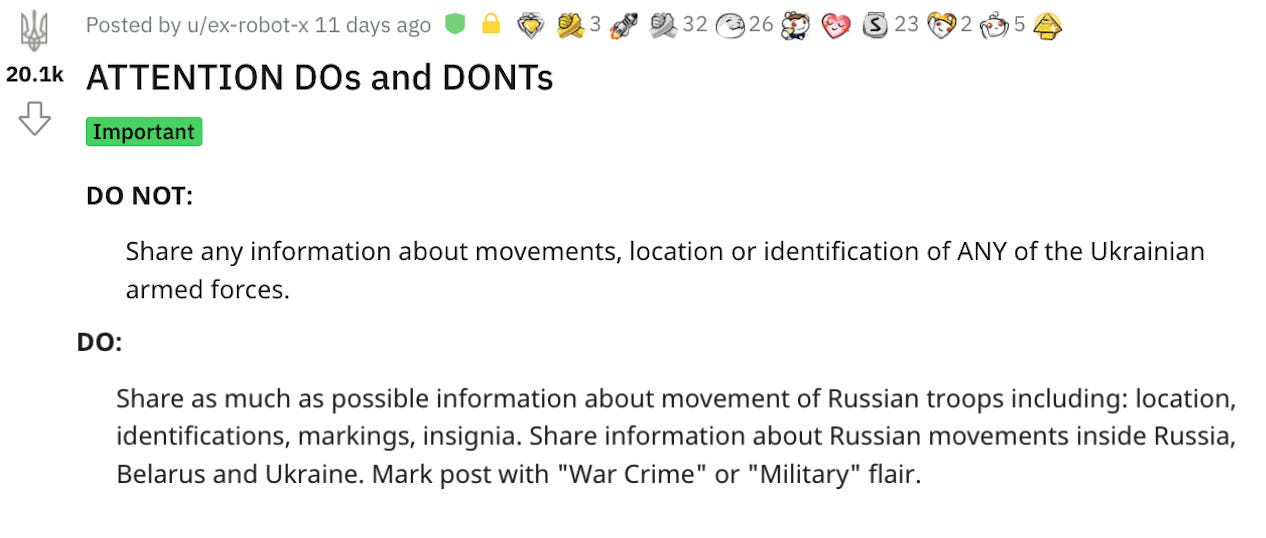
This has led OSINT (Open Source Intelligence) groups to make Russians transparent.
Exhibit A: Texting all Russians.
Interesting attempt to bypass Russia's blackout on news from Ukraine - sending text messages with the truth about Putin's war to thousands and thousands of Russian mobile numbers.👇 https://t.co/FGYK79YB0t
— Jimmy (@JimmySecUK) March 7, 2022
Exhibit B: GenZ kid tracks jets and yachts for all Russian oligarchs.
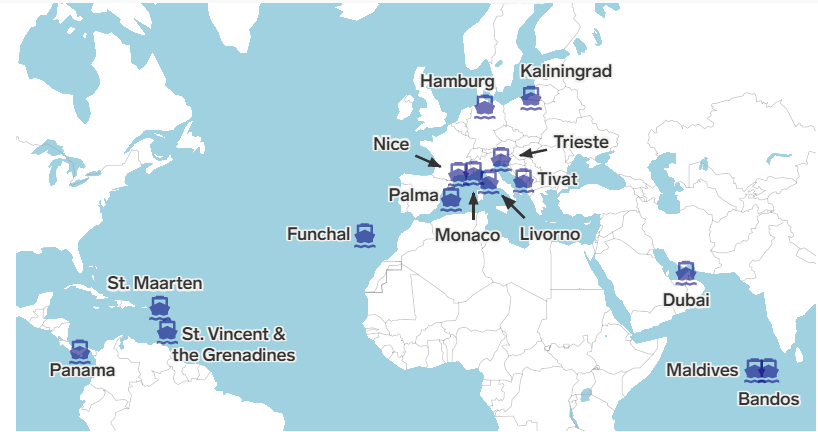
Exhibit C: Sharing Personal Information on 100,000 Russian Soldiers. Hoping to trigger Russian mothers protesting back home.

5. When Everything Is Public, Everything Is A Performance
Politics has shifted from private policy to public performance.
When everything is a public performance we get an arms race of virtue signaling, for good and for bad.
For example, the Swiss are no longer banking Russian oligarchs. They were the “neutral” shadow bank for Nazi Germany.
Can you imagine how much they’d be canceled for that today?
Shadow banking no longer.
Transparency for the powerful, privacy for the powerless! ✊
6. Ukraine Has Captured This Memetic Moment
We are transitioning to endemic COVID.
But this pandemic dominated the headlines for 2 years.
Something needed to take its place. News needs to be consumed. The people need to be informed. The eyeballs need to look at something.
That thing is Ukraine.
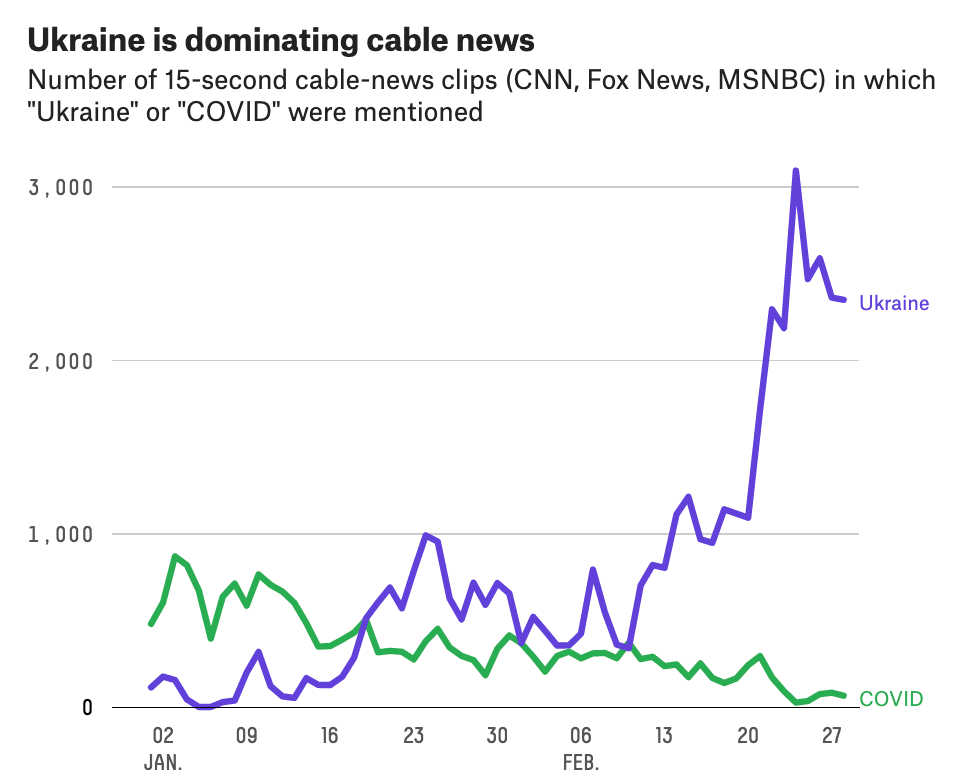
Meanwhile, 63 people died in a suicide bombing last week in Pakistan.
But Ukraine has the memetic moment, sorry.
7. Purity Spirals Should Be Flagged
According to my good internet friend pizzleswizzle at Urban Dictionary, a purity spiral is:
A social ratchet effect within a community. A process of moral outbidding which, unchecked, corrodes the group from within, rewarding those who put themselves at the extremes and punishing nuance relentlessly.
This is an inevitable structure that shows up across a variety of memeplexes in history like Maoist struggle sessions and feminist trashing (now called woke signaling).
Meanwhile, in the context of Ukraine, we see this on the left and right. Lefties signal their support for Ukraine by caring more than each other (#StandWithUkraine). Righties call Biden weak and call for increasingly jingoist behavior like a no-fly zone.
Purity begets purity.
Lefties don’t want to be called out as Russian sympathizers. Righties don’t want to be called out as weak.
We should flag purity spirals as soon as we see them. Like all reinforcing feedback loops, they lead to destructive behavior.
8. Authoritarian Subreddits Fall Down A Memeplex They Can’t Escape
r/Russia had 265,000 members last week. These members posted all kinds of disinformation, like the belief that the war was liberating Ukrainians from Nazism.
But, like r/The_Donald before it, r/Russia was just recently quarantined by Reddit for a “high volume of disinformation.”
Even Russian academics are polarized. Roughly half believe they are saving the Ukrainians from genocide. (Those with PHDs are almost as susceptible to fake news because they don’t do lateral reading.)
9. Charismatic Politicians Win The Internet
Ukrainian president Volodymyr Zelensky was a TV star before he was president.
Political races are a battle over charisma.
Like Trump and AOC before him, Zelensky is extremely charismatic.
Whether right or wrong, the EU’s sanctions on Russia seems like an emotional response, not a logical one.
It's easy to joke about Zelensky's entertainment career, but his sense of theatricality seems to have played a significant role in Europe's surprisingly harsh response to Russia https://t.co/QB3ISJQ1dE pic.twitter.com/GC5vi53Muh
— Zack Beauchamp (@zackbeauchamp) February 28, 2022
Ok this time, but worrying in the long-term.
As they write in the Sovereign Individual:
“A system that routinely submits control over the largest, most deadly enterprises on earth to the winner of popularity contests between charismatic demagogues is bound to suffer for it in the long run.”
III. Energy
10. Supply Chains in Everything
Shipping supply chains are the circulatory system of our earth. They provide us with the goods we need to survive.
Russia is a huge exporter of wheat. Prices are up 2x.
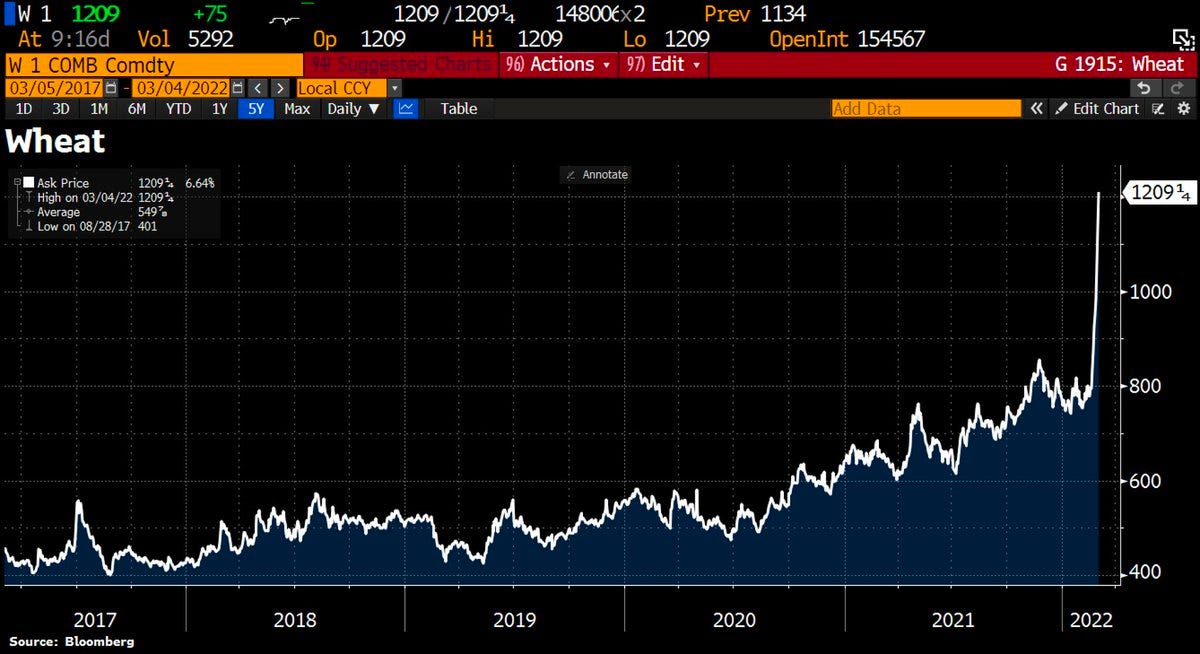
Basic food prices are a strong indicator of global unrest.
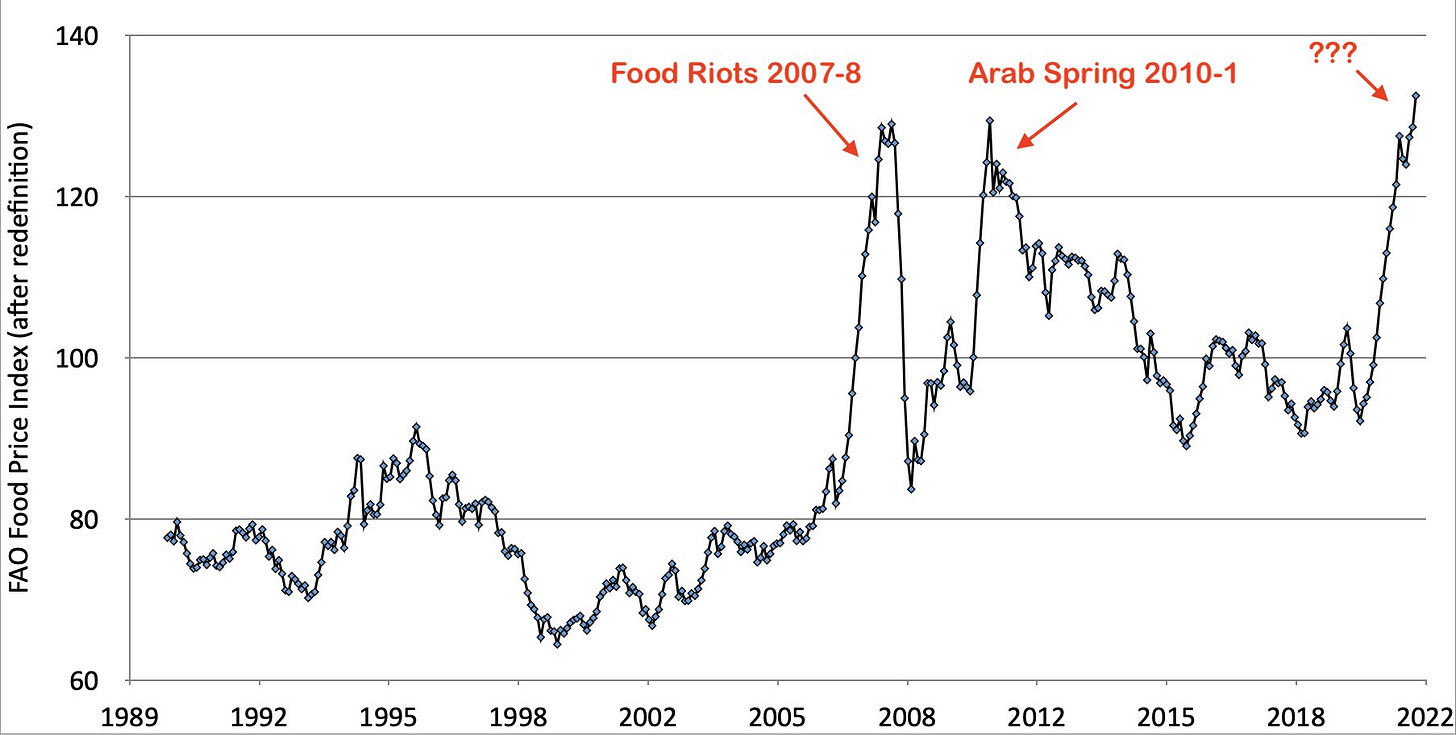
That’s a recipe for disaster.
Nickle prices are also up 2x, the largest ever price increase. This will affect stainless steel and batteries.
For more on supply chains, read Flexport research here. I expect an extremely low click-through rate on a link to supply chain research but ¯\_(ツ)_/¯.
11. It’s The Business Model, Stupid!
Russia is a Petrostate. 50% of their government income comes from oil and gas.
Ukraine was starting to rival them. They put tariffs on Russian pipelines to Europe. Ukraine rose to the 14th-largest reserves of natural gas in 2005 after finding fields in Crimea in the south and near the regions of Donetsk and Luhansk in the east.
Russia has now taken those regions of Crimea, Donestk, and Luhansk. Or rather, they have “supported” breakaway movements there.
This gives them control over tons of energy reserves.
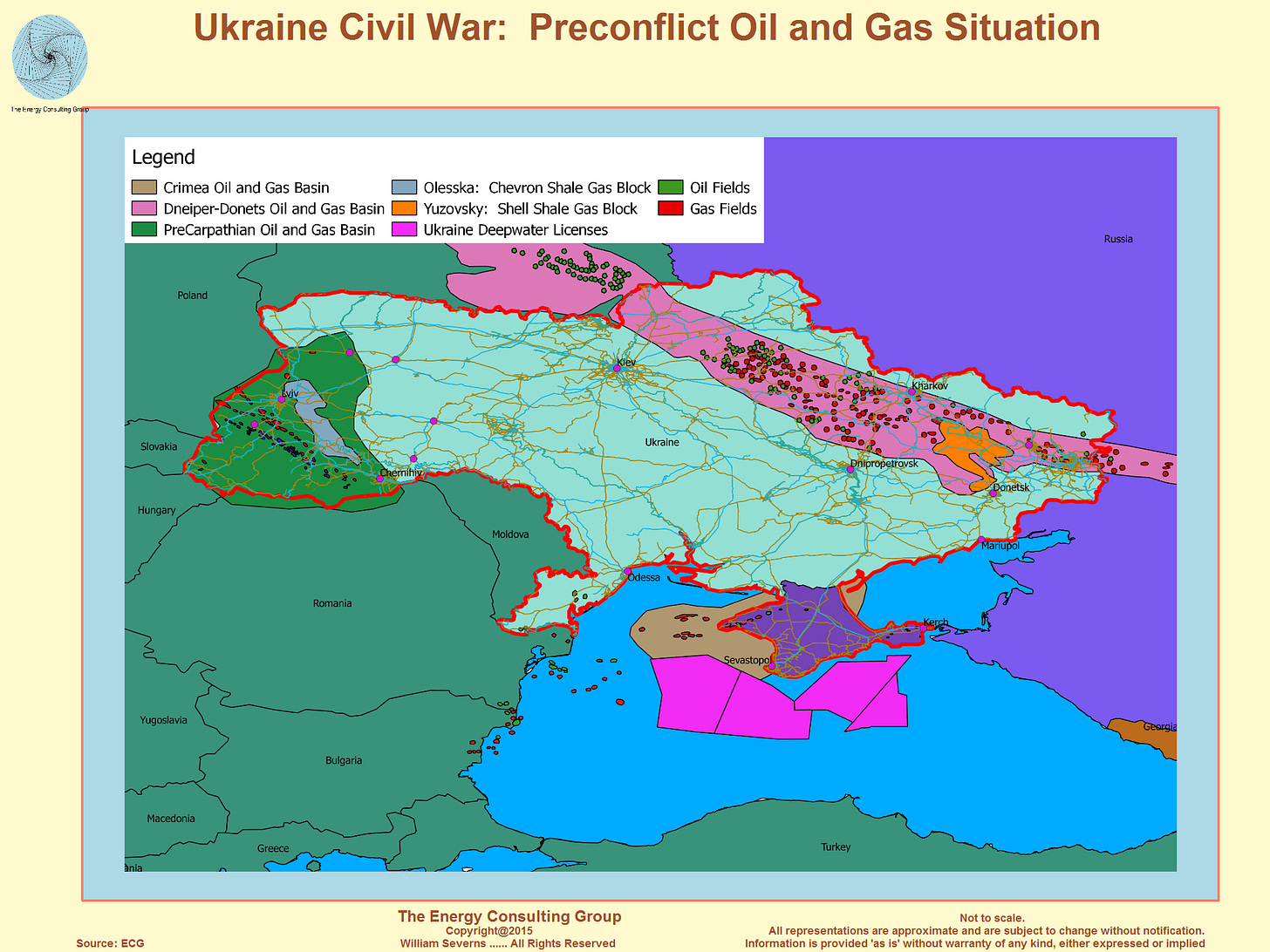
If Russia wants to continue to be a Petrostate, they need Crimea, Donestk, and Luhansk.
China was never not going to control Tibet. Russia was never not going to take Crimea and the regions in the east.
12. Petrostates Create Dictators Like Putin
Putin isn’t special.
He’s inevitable given Russia’s position as a Petrostate.
The Dictator’s Handbook explains why. In the image below, you can see how:
- On the left, the government has a strong civil society and an educated populace which leads to lots of taxable revenue and a balanced set of “keys to the government”.
- On the right, the government gets all of their income from natural resources like oil, gold, and diamonds, so the “keys to the government” are held by few. It’s an autocracy.
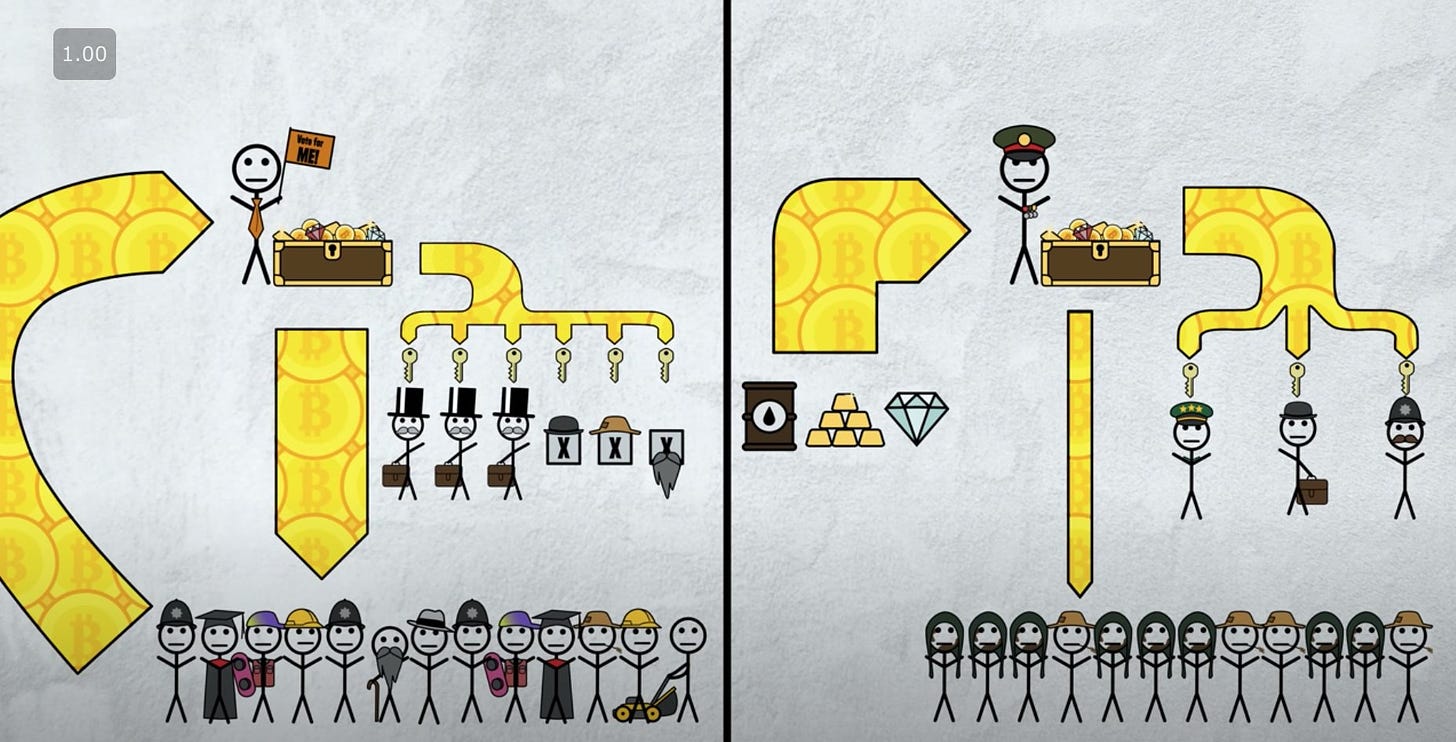
13. We Need An Exit Ramp For Petrostates
Meanwhile, Russia isn’t the only Petrostate. In fact:

We need to find a way to hospice the Dominant System (nation-state fossil fuels) and transition into the Emerging System (solarpunk, anyone).
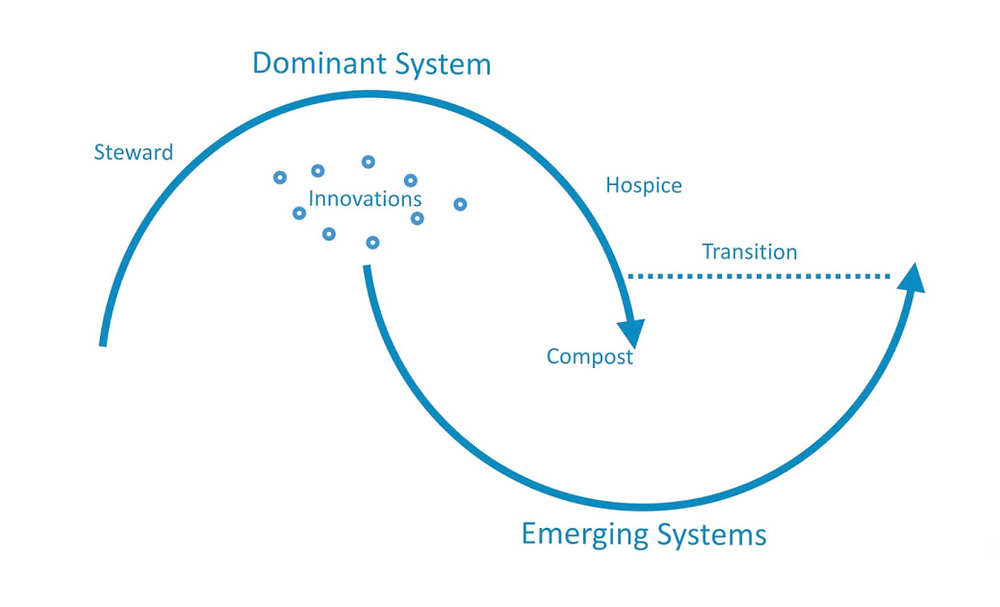
IV. Geopolitics in the 2020s
14. Nuclear War Looms Large…ish
We should have a community dashboard that tracks key metrics of the war like the number of casualties, supply chain impacts, and military costs.
The most important metric is the percent chance of nuclear war. Even if 100,000 people die in the conflict, that would be much less than the millions (or billions) in a nuclear scenario.
Interestingly, these odds aren’t that low:

Since the war began in Ukraine, the rough odds that a nuke is used in 2022 have gone up to 5%. That’s too high! (contra)
Putin and Biden remember the Cold War, which is good. In 2050, when GenZ’s rule the world, they will not remember. We’ll need to relearn the game theory of mutually assured destruction or find a new stable attractor between the US and China.
15. NATO Desires Are Inevitable
Our values as a species are changing. As capitalism has spread, we’ve valued self-expression (freedom) more and tradition less.
If the people value freedom, the government needs to grant it.
This is called Government-Value Fit.
The image below shows this process during the fall of the USSR.
- The right of the x-axis shows countries that value freedom but didn’t have a democracy in 1980. Most of the USSR.
- The top of the y-axis shows countries that got more democratic from 1980 to 1990. Again, most of the USSR.
In the top right corner are all the USSR countries. The people valued freedom and they got democracy.
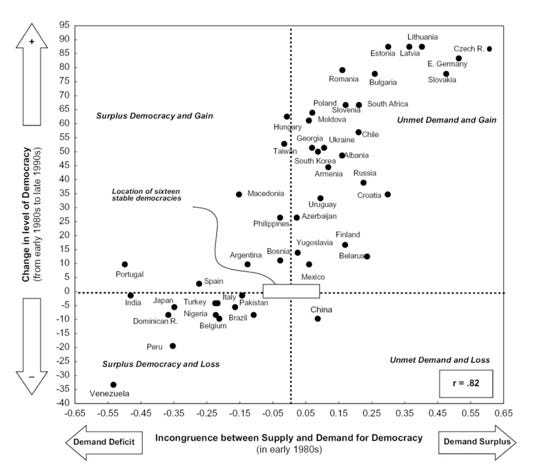
More than a dozen countries have joined NATO since 1997. Ukraine was next.
Thanks for reading and let me know if you have any pushback or thoughts on any of these points!
❤️ Thanks to my generous patrons ❤️
Laurel Petterson, Eric Tang, Chris Densmore, Maciej Olpinski, Jonathan Washburn, Ben Wilcox, Audra Jacobi, Sam Jonas, Patrick Walker, David Hanna, Benjamin Bratton, Michael Groeneman, Haseeb Qureshi, Jim Rutt, Zoe Harris, David Ernst, Brian Crain, Matt Lindmark, Colin Wielga, Malcolm Ocean, John Lindmark, Collin Brown, Ref Lindmark, James Waugh, Mark Moore, Matt Daley, Peter Rogers, Darrell Duane, Denise Beighley, Scott Levi, Harry Lindmark, Simon de la Rouviere, and Katie Powell.